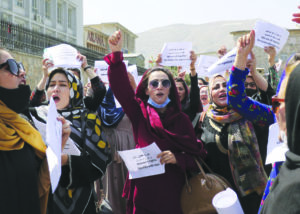The recent announcement that women and girls in Afghanistan have been banned by the Taliban government from visiting parks and gyms – even if accompanied by a male “chaperone” – has understandably been greeted with outrage.
The UN special representative in Afghanistan for women, Alison Davidian, said it was “yet another example of the Taliban’s continued and systematic erasure of women from public life,” adding, “We call on the Taliban to reinstate all rights and freedoms for women and girls.”
In the past 50 years, from the occupation by Soviet troops and US-led international forces, to the takeover by the Taliban in August 2021, women’s rights have been often exploited for political gain packaged as a justification for war. At times things have slightly improved for women, but most of the time their rights have significantly been violated.
Women’s rights were enshrined in the post-invasion constitution introduced with US backing in 2004. The constitution allocated 25% of parliamentarian and provincial council seats to women, as well as 30% of civil service positions.
 The constitution also obliged the Afghan government to respect and implement international conventions on women’s rights. Alongside this, the Ministry of Women’s Affairs was created as the main body responsible for women’s rights and empowerment.
The constitution also obliged the Afghan government to respect and implement international conventions on women’s rights. Alongside this, the Ministry of Women’s Affairs was created as the main body responsible for women’s rights and empowerment.
After the Taliban takeover, this progress was quickly overturned. Only a month after coming to power, the Taliban government disbanded the Ministry of Women’s Affairs (MoWA) and replaced it by what they called a ministry for the “propagation of virtue and the prevention of vice”. Women were completely excluded from working for the Taliban’s interim government, except for those cleaning female bathrooms.
The government told reporters that women should refrain from attending work until “proper systems” were put in place to “ensure their safety”. Women were barred from their workplaces, sent, or escorted home by and told they would be replaced by their male relatives.
Similarly, women and girls’ access to education was curtailed. Upon taking power, Taliban leaders announced that a “safe learning environment” was required before women and girls could return to education.
In September 2021, the authorities announced that secondary education (above grade 6) would resume for boys, but access for girls was not mentioned. Without access to education, girls are at a higher risk of child marriage and abuse.
In May 2022, the Taliban commanded women to cover their faces in public and instructed them to remain in their homes except in cases of necessity. Women were banned from travelling long distances without a male chaperone.
Shelters supporting women and girls fleeing domestic abuse were closed, and staff were forced to send many survivors back to their “abusers”.
Fariha was nine months pregnant when she told Amnesty International: “Before, there was a shelter … They said it’s not running now … There are no options for me now.”
Child and forced marriages, meanwhile, have reportedly increased in the past year, despite the Taliban’s claim to oppose them. Amid all this, an increase of suicides among women has been reported.
Fighting the patriarchy
Yet Afghan women continue to make history with their acts of courage, peacefully protesting against restrictions, while being harassed, threatened, arrested, detained and tortured.
Stripped of their rights, under constant threat of violence, Afghan women and girls are claiming their agency and sharing their stories in news outlets and online.
All this has been happening as many Muslim countries are witnessing a revival of feminism. Young women, in particular, are becoming increasingly interested in feminist ideas as a way of making sense of their lives.
In the 1980s and 1990s, an Islamic feminism emerged using Islam and its doctrines as the single essential element in women’s lives and identities.
But a new wave of young Aghan women are adopting feminist ideas which do not necessarily operate from a religious standpoint.
But the Taliban are not the only issue for Afghan women. Indeed, feminists in many Muslim countries face a dual problem. There is the patriarchal cultural setup which sees women as subordinate to men.
And then there is the difficulty of fighting for women’s rights in the face of a religious establishment which demonises them for challenging what they see as “fundamental” Islamic teaching.
In turn the religious authorities in Afghanistan are accusing these feminists of being westernised, inauthentic and sometimes anti-nationalist.
Frustratingly, the western world has always found it hard to look past what it sees as Afghan women’s victimhood. This has become the default western attitude towards women in virtually all traditional Islamic societies, because the west remains fixated on the idea that freeing women from oppression is a byproduct of defeating fundamentalist Islam – which it sees as indelibly linked with terrorism.
Meanwhile the growing isolation of Afghanistan from the west – and the harsh economic sanctions that are crippling the country financially – makes life all the harder as it is denying young Afghan women any agency they might be able to achieve in a flourishing economy.
This makes it all the more urgent that the world hears, understands and supports voices of Afghan women, rather than imposing a version of western feminism which has already proved unfit in Muslim contexts. (The Conversation)



